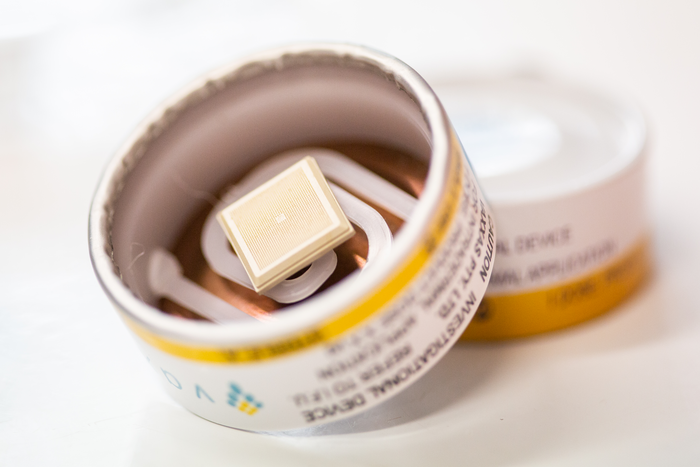A needle-free vaccine patch could better fight COVID-19 variants, such as Omicron and Delta, than a traditional needle vaccine according to a University of Queensland study in mice.

Credit: The University of Queensland
A needle-free vaccine patch could better fight COVID-19 variants, such as Omicron and Delta, than a traditional needle vaccine according to a University of Queensland study in mice.
The research, conducted in partnership with Brisbane biotechnology company Vaxxas, tested the Hexapro SARS-CoV-2 spike vaccine using the Vaxxas high-density microarray patch (HD-MAP) technology, and the results found the patch was far more effective at neutralising COVID-19 variants.
UQ’s Dr Christopher McMillan said the vaccine patch appeared to counteract new variants more effectively than the current SARs-CoV-2 vaccine delivered by injection.
“The high-density microarray patch is a vaccine delivery platform that precisely delivers the vaccine into the layers of the skin which are rich in immune cells,” Dr McMillan said.
“We found that vaccination via a patch was approximately 11 times more effective at combatting the Omicron variant when compared with the same vaccine administered via a needle.”
He said the results extended further than just the Hexapro vaccine.
“So far, every vaccine type we have tested through the patch, including subunit, DNA, inactivated virus and conjugate produces superior immune responses compared to traditional needle vaccination methods,” he said.
UQ’s Dr David Muller said currently-available vaccines may not be as effective because of the constantly emerging new variants of COVID-19, and this has left researchers at a crossroads.
“This decreased effectiveness was highlighted by the Omicron variant, which contains over 30 mutations in the spike protein,” Dr Muller said.
“The large number of mutations have given the virus the ability to evade the immune responses generated by the current vaccines.
“However, the patch technology has the potential to offer a new – and more effective – weapon in our arsenal, at a time where new variants are mutating at a rapid rate.
“The patches are not only more effective against emerging variants but are also far easier to administer than needle-based vaccines.
“But, it is important to stress that existing vaccines are still an effective way of combatting serious illness and disease from this virus and it is not the time to drop our guard.”
Vaxxas CEO, David Hoey said this is further evidence of the game-changing potential the technology platform could have in helping nations better respond to global health emergencies, like the current and future pandemics.
“We are continuing to scale-up our manufacturing capabilities and accelerate product development in preparation for large-scale clinical trials,” he said.
“This includes construction of our first manufacturing facility in Brisbane to support the transition to commercialising of our HD-MAP vaccine candidates, including a Hexapro COVID-19 patch.”
The research has been published in Vaccine.
The study was funded by an Advance Queensland Industry Research Fellowship awarded to Dr David Muller.
Journal
Vaccine
DOI
10.1016/j.vaccine.2022.07.013
Article Title
Skin-patch delivered subunit vaccine induces broadly neutralising antibodies against SARS-CoV-2 variants of concern
Article Publication Date
18-Jul-2022




